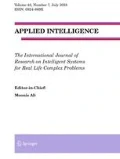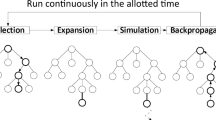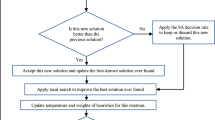Abstract
Depth First Search (DFS) pseudo-tree is popularly used as the communication structure in complete algorithms for solving Distributed Constraint Optimization Problems (DCOPs) from multiagent systems. The advantage of a DFS pseudo-tree lies in its parallelism derived from pseudo-tree branches because the nodes in different branches are relatively independent and can compute concurrently. However, the constructed DFS pseudo-trees in experiments often come to be chain-like and greatly impair the performances of solving algorithms. Therefore, we propose a new DPOP algorithm using a Breadth First Search (BFS) pseudo-tree as the communication structure, named BFSDPOP. Compared with a DFS pseudo-tree, a BFS pseudo-tree is more excellent on the parallelism as it has much more branches. Another notable advantage is that the height of a BFS pseudo-tree is much lower than that of a DFS pseudo-tree, which gives rise to the shorter communication paths and less communication time. The method of Cluster Removing is also presented to allocate cross-edge constraints to reduce the size of the largest message in BFSDPOP. In the experiment, BFSDPOP with a BFS pseudo-tree and original DPOP with a DFS pseudo-tree are compared on three types of problems - graph coloring problems, meeting scheduling problems and random DCOPs. The results show that BFSDPOP outperforms original DPOP in most cases, which proves the excellent attributes of BFS pseudo-tree over DFS pseudo-tree.













Similar content being viewed by others
References
Cerquides J, Farinelli A, Meseguer P et al (2014) A tutorial on optimization for multi-agent systems. Comput J 57(6):799–824
Leite A, Fabrício E, Jean-Paul A (2014) Distributed Constraint Optimization Problems: Review and perspectives. Expert Syst Appl 41(11):5139–5157
Farinelli A, Rogers A, Jennings N (2013) Agent-based decentralised coordination for sensor networks using the max-sum algorithm. Auton Agent Multi-Agent Syst 28(3):337–380
Hosseini S, Basir O (2013) Target to sensor allocation: A hierarchical dynamic Distributed Constraint Optimization approach. Comput Commun 36(9):1024–1038
Zivan R, Yedidsion H, Okamoto S et al (2015) Distributed constraint optimization for teams of mobile sensing agents. Auton Agent Multi-Agent Syst 29(3):495–536
Sultanik E, Modi P, Regli W (2007) On modeling multiagent task scheduling as a distributed constraint optimization problem. In: Proceedings of the 20th international joint conference on artificial intelligence, pp 1531–1536
Enembreck F, André J (2012) Distributed constraint optimization with MULBS: a case study on collaborative meeting scheduling. J Netw Comput Appl 35(1):164–175
Petcu A, Faltings B (2008) Distributed constraint optimization applications in power networks. Int J Innov Energy Syst Power 3(1):1–12
Kumar A, Faltings B, Petcu A (2009) Distributed constraint optimization with structured resource constraints. In: Proceedings of the 8th international conference on autonomous agents and multiagent systems, pp 923–930
Miller S, Ramchurn S, Rogers A (2012) Optimal decentralised dispatch of embedded generation in the smart grid. In: Proceedings of the 11th international conference on autonomous agents and multiagent systems, pp 281–288
Mandiau R, Vion J, Piechowiak S et al (2014) Multi-variable distributed backtracking with sessions. Appl Intell 41(3):736–758
Yokoo M, Ishida T, Durfee E et al (1992) Distributed constraint satisfaction for formalizing distributed problem solving. In: Proceedings of the 12th international conference on distributed computing systems, pp 614–621
Fioretto F, Pontelli E, Yeoh W (2016) Distributed con-straint optimization problems and applications: A survey. arXiv preprint arXiv:http://arXiv.org/abs/1602.06347
Zivan R, Okamoto S, Peled H (2014) Explorative anytime local search for distributed constraint optimization. Artif Intell 212(4):1–26
Hirayama K, Yokoo M (2005) The distributed breakout algorithms. Artif Intell 161(1):89–115
Okamoto S, Zivan R, Nahon A (2016) Distributed breakout: Beyond satisfaction. In: Proceedings of the 25th international joint conference on artificial intelligence pp 447–453
Zhang W, Wang G, Xing Z (2005) Distributed stochastic search and distributed breakout: properties, comparison and applications to constraint optimization problems in sensor networks. Artif Intell 161(1):55–87
Maheswaran R, Pearce J, Tambe M (2006) A family of graphical-game-based algorithms for distributed constraint optimization problems. Coordination of large-scale multia-gent systems, pp 127–146
Chapman A, Rogers A, Jennings N et al (2011) A unifying framework for iterative approximate best-response algorithms for distributed constraint optimization problems. Knowl Eng Rev 26(4):411–444
Farinelli A, Rogers A, Petcu A et al (2008) Decentralised coordination of low-power embedded devices using the max-sum algorithm. In: Proceedings of the 7th international conference on autonomous agents and multiagent systems, pp 639–646
Rogers A, Farinelli A, Stranders R et al (2011) Bounded approximate decentralised coordination via the max-sum algorithm. Artif Intell 175(2):730–759
Rollon E, Larrosa J (2012) Improved bounded max-sum for distributed constraint optimization. Principles and Practice of Constraint Programming of the series Lecture Notes in Computer Science, pp 624–632
Ottens B, Dimitrakakis C, Faltings B (2012) DUCT: An upper confidence bound approach to distributed constraint optimization problems. In: Proceedings of the 11th international conference on autonomous agents and multiagent systems, pp 528–534
Nguyen D T, Yeoh W, Lau H C (2013) Distributed Gibbs: A memory-bounded sampling-based DCOP algorithm. In: Proceedings of the 12th international conference on autonomous agents and multiagent systems, pp 167–174
Fiorretto F, Campeotto F, Fiorretto L et al (2014) GD-Gibbs: A GPU-based Sampling Algorithm for Solving Distributed Constraint Optimization Problems. In: Proceedings of the 13th international conference on autonomous agents and multiagent systems, pp 1339–1340
Mailler R, Lesser V (2004) Solving distributed constraint optimization problems using cooperative mediation. In: Proceedings of the third international joint conference on autonomous agents and multiagent systems, pp 438–445
Grinshpoun T, Meisels A (2008) Completeness and performance of the APO algorithm. J Artif Intell Res 33:223–258
Hirayama K, Yokoo M (1997) Distributed partial constraint satisfaction problem. Principles and Practice of Constraint Programming, pp 222–236
Gershman A, Meisels A, Zivan R (2009) Asynchronous forward bounding. J Artif Intell Res 34:25–46
Netzer A, Grubshtein A, Meisels A (2012) Concurrent forward bounding for distributed constraint optimization problems. Artif Intell 193:186–216
Modi P J, Shen W M, Tambe M et al (2005) ADOPT: Asynchronous Distributed constraint optimization with quality guarantees. Artif Intell 161(1):149–180
Silaghi M, Yokoo M (2006) Nogood based asynchronous distributed optimization (adopt-ng). In: Proceedings of the 5th international conference on autonomous agents and multiagent systems,pp 1389--396
Silaghi M, Yokoo M (2009) Adopt-ing: unifying asynchronous distributed optimization with asynchronous backtracking. Auton Agent Multi-Agent Syst 19(2):89–123
Yeoh W, Felner A, Koenig S (2010) BnB-ADOPT: An asyn-chronous branch-and-bound DCOP algorithm. Journal of Ar-tificial Intelligence Research, pp 85–133
Gutierrez P, Meseguer P (2012) Improving bnb-ADOPT +-AC. In: Proceedings of the 11th international conference on autonomous agents and multiagent systems, pp 273–280
Gutierrez P, Lee J H M, Lei K M et al (2013) Maintaining Soft Arc Consistencies in bnb-ADOPT + during Search. In: Principles and practice of constraint programming of the series lecture notes in computer science, pp 365–380
Petcu A, Faltings B (2005) A scalable method for multiagent constraint optimization. In: Proceedings of the 19th international joint conference on artificial intelligence, pp 266–271
Petcu A, Faltings B (2006) ODPOP: An algorithm for open distributed constraint optimization. In: Proceedings of AAAI conference on artificial intelligence, pp 703–708
Petcu A, Faltings B (2007) MB-DPOP: A new Memory-Bounded algorithm for distributed optimization Proceedings of the 20th International joint conference on artificial intelligence, pp 1452–1457
Vinyals M, Rodríguez-aguilar JA, Cerquides J (2009) Generalizing DPOP: Action-GDL, a new complete algorithm for DCOPs Proceedings of the 8th international conference on autonomous agents and multiagent systems, pp 1239–1240
Brito I, Meseguer P (2010) Improving DPOP with function filtering. In: Proceedings of the 9th international conference on autonomous agents and multiagent systems pp 141–158
Fioretto F, Le T, Yeoh W et al (2014) Improving DPOP with branch consistency for solving distributed constraint optimization problems Principles and Practice of Constraint Programming of the series Lecture Notes in Computer Science, pp 307–323
Atlas J, Keith D (2007) A complete distributed constraint optimization method for non-traditional pseudotree arrangements. In: Proceedings of the 6th international joint conference on autonomous agents and multiagent systems, pp 741–748
Chen Z, Wang L, He Z et al (2015) Analysis of complete DCOP algorithms’ communication structures. J Comput Inf Syst 11(8):2971–2979
Petcu A (2007) A class of algorithms for distributed constraint optimization. Ecole Polytechnique Federale de Lausanne (EPFL), Switzerland
Leaute T, Faltings B (2013) Protecting privacy through distributed computation in multi-agent decision making. J Artif Intell Res 47(4):649–695
Dechter R (2003) Constraint processing. Morgan Kaufmann
Brito I, Meseguer P (2010) Cluster tree elimination for distributed constraint optimization with quality guarantees. Fund Inf 102(3):263–286
Hogg T, Huberman B A, Williams C (1996) Phase transitions and the search problem. Artif Intell 81:115
Acknowledgments
This work is partly supported by Chongqing University Postgraduates’ Innovation Project (Project No. CYS14018), the Fundamental Research Funds for the Central University of China (Project No. 106112013CDJZR180013) and the Postdoctoral Science Foundation of Chongqing in China (Project No. Xm201324).
Author information
Authors and Affiliations
Corresponding author
Rights and permissions
About this article
Cite this article
Chen, Z., He, Z. & He, C. An improved DPOP algorithm based on breadth first search pseudo-tree for distributed constraint optimization. Appl Intell 47, 607–623 (2017). https://doi.org/10.1007/s10489-017-0905-4
Published:
Issue Date:
DOI: https://doi.org/10.1007/s10489-017-0905-4




